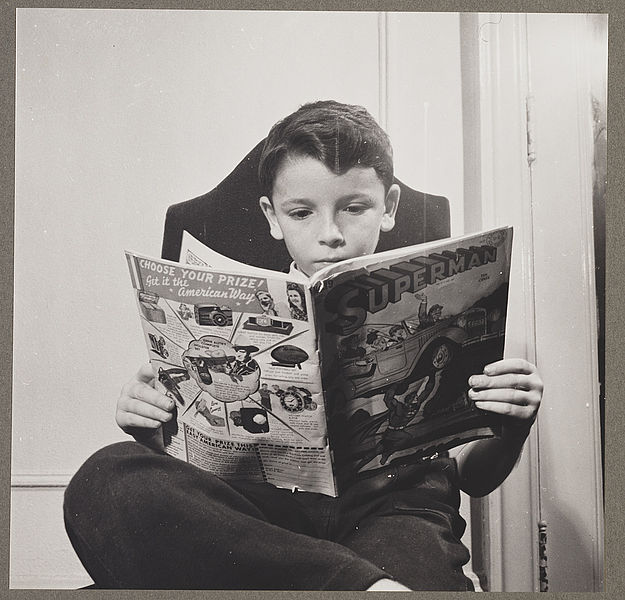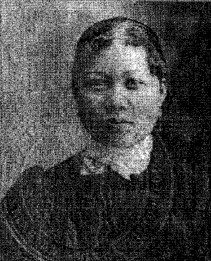Winner of the Fall 2016 StMU History Media Award for
Best Featured Image
Best Article in the Category of “United States History”
During the Great Depression and World War II, most Americans wanted to find happiness in anything. Throughout this era, there were not many places people could find happiness; so they began looking for entertainment in books. However, these were not just any ordinary types of books; they were indeed comic books.

Malcolm Wheeler-Nicholson was the founder of the first comic magazine, which was called New Fun. Although his comic did poorly, Malcolm was able to create a company called Detective Comics. The company was able to create a new magazine called Action Comics, founded in 1937.1 But before Malcolm was able to publish the new magazine, he fell into bankruptcy. Disregarding his personal setback, the company carried on without his involvement. The first issue in Action Comic was published in 1938. The comic consisted of an abnormal man who had incredible strength and wore a skintight suit, commonly known as Superman. In the span of a year, Superman had received his own book title and sold over 1.2 million copies per issue. It later became a radio show in 1940, opening with the phrase “It’s a bird! It’s a plane! No, it’s…Superman!”2 Eventually other publishers began developing their own superheroes as well. The second comic, which was produced in 1939, is the now popularly known comic series Marvel Comics. By 1940’s Superman was joined by other heroes such as: the Human Torch, the Sub-Mariner, Batman, the Flash, and Wonder Woman.3 In fact, Wonder Woman was meant to represent the importance of women in the war effort. During the boom of new superheroes being created, Superman was still the most popular of them all.

Unfortunately the comic industry was attacked by educators, psychiatrists, journalist, and even the federal government. They believed comics had no beneficial outcomes for society; instead of bringing entertainment, they were promoting ideas of violence and crime. They also believed that not only did the comics bring harmful thoughts to young minds, but the thin paper was supposedly destroying their eyesight.4 Despite the numerous complaints, Congress took no legal action against the publishers of the books. With this incident, it helped create a trade system, known as the Comic Codes, to help prevent indecency in the industry.5
No one could have guessed that comic books would have created some issues for years to come. For example, various art teachers discovered that the students who disliked and were performing poorly in art class, were the same students who had an interest in comic books; they were often getting into trouble for sketching comics instead of paying attention.6 The students wanted to get away from reality and what better way to do so than by creating your own story-line in a comic book?
That is the whole reason comic books were created, to help distract people from the tough times they were experiencing in life. That is why most people enjoyed them, because they wanted to escape reality by reading about situations that could never happen in real life, by flooding the minds of people of all ages with imagination. It is not hard to see why Americans would be very entertained by the concept of superheroes; they were created to help prevent disasters and to comfort those who were frightened by real-world events. For that reason this era was the perfect time for comic books to emerge. Some people were opposed to them, but in general they helped society in several ways. Although comics may not be as popular as they once were, it gave Americans a new world to discover, even if it was just imaginary.
- Alan Brinkley, American History: Connecting with the Past Volume 2, 15 edition (New York, NY: McGraw-Hill Education, 2014), 676. ↵
- Brinkley, American History: Connecting with the Past Volume 2, 676. ↵
- Brinkley, American History: Connecting with the Past Volume 2, 676. ↵
- Robert L. Coard, “The Comic Book in Perspective,” Peabody Journal of Education 33, no. 1 (1955): 18. ↵
- Brinkley, American History: Connecting with the Past Volume 2, 677. ↵
- Jay Berkowitz and Todd Packer, “Heroes in the Classroom: Comic Books in Art Education,” Art Education 54, no. 6 (2001): 12. ↵



118 comments
Analina Devora
This was an extremely interesting article. It’s crazy to think that he went bankrupt and still continued with his work. Imagine if he quit then and there, we would have a world with no Superman and maybe no superheroes at all. It’s good to hear that Wonder Woman was meant to stress the importance of women in the war effort rather than just an over sexualized character as she may be portrayed now a days. Well done!
Alyssa Almaguer
I enjoyed reading this article very much! Even though America was in a difficult situation, it is interesting that from this hard time emerged a new means of entertainment. These comics are still celebrated by people today since every year at least one new Marvel movie comes out and they are wildly successful. Great article!
Nicolas McKay
This was an amazing article. I personally love comic books and I thought you did a great job telling this story. When Joe Seigell and Jerry Schuster (The creators of Superman) first pitched the idea, superman was a telepathic villain, and the story was going to be called “Wrath of the Super-Man”. After the story was handed back to them they decided to make him the super heroic character that everyone knows today. I think Its interesting how not only Superman’s story, but even the stories involved in making him are equally as interesting and inspirational.
Jocelyn Alvarez Bibian
Very well written article! Personally, I am not a comics fan, but I enjoyed reading about the way comic books emerged. It was really creative from Malcolm’s part to create a character who would help people liberate from the tension of the war. I found quite interesting the fact that Wonder Woman was created to portray the efforts of women during the war. If someone ever saw this character as a role model, I am sure today they are able to identify how she emerged from role models as well. Good job!
Ivanna Rodriguez
This was an incredibly interesting article! Especially because of all the hype Marvel and DC comics are producing at the moment. It was interesting to find out how the first comic book ever was Superman. As well as finding out comics were a source of distraction for such a distraught time in the U.S. Amazing job! Keep up the good work!
Trey Whitworth
Very well done! I remember reading somewhere that one could also view superheroes as an evolution of mythic or legendary heroes. In fact, despite the Christ symbolism that surrounds Superman in modern depictions, Jerry Siegel and Joe Shuster, the creators of Superman were actually Jewish. Aspects of Superman’s story were originally meant to parallel Moses. Just as the infant Moses was put into a basket by his mother to escape the slaughter of the Hebrew baby boys, the infant Kal-El/Superman was put into a rocket by his parents to escape Krypton’s destruction. The baby Kal-El/Superman is found and adopted by the Kents, just as Moses was found and adopted by the pharaoh’s daughter. Superman eventually learns of his true Kryptonian heritage and is a champion for the poor and downtrodden as an adult, paralleling Moses becoming the champion of the Israelites. That said, because Moses is viewed by Christians as “pointing forward” to Christ, the interpretation of Superman-as-Jesus is as valid as the interpretation of Superman-as-Moses.
Angelica Espinoza
I really enjoyed this article! Very interesting and I actually just came from a huge book sale. The comics section was insane! So many people were thumbing through every single comic looking for their preferred ones. I found a few gems myself, but I definitely agree with you in that comics and most fiction is meant to help us escape reality. I think Malcom saw a need for this escape in many people, because war changes a country. I don’t think anyone could’ve guessed that comics would become so popular, or even that we’d still be making movies of all these characters to this day. Very good and relatable topic, nice execution!
Mehmet Samuk
Well written article !! I really like your analysis of the effects of comics on the American society. How they escaped from hardships of the day to an imaginary world. Before reading the article I thought comics were only for entertainment. Also, I think it is a business success of Malcolm who saw the need of the society and came up with an innovative and interesting entertainment. After his Superman many other heroes followed.